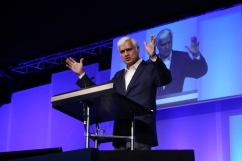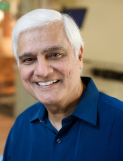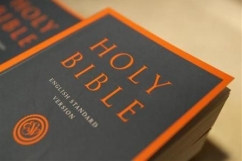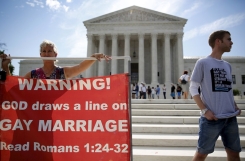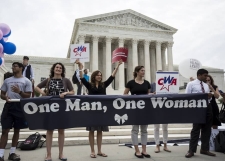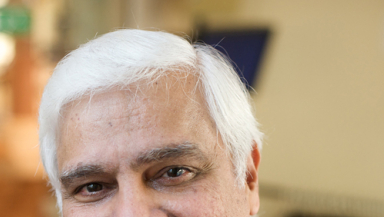
"Compromising the truth is a serious blunder" but we must always live out our beliefs with love and grace, Ravi Zacharias has said in a detailed blog post addressing same-sex relationships.
The author and speaker who founded The Zacharias Trust, which together with Wycliffe Hall has established The Oxford Centre for Christian Apologetics (OCCA), says he is against gay marriage, and points to the biblical description of one man and one woman in sacred commitment. "So profound is this union that the relationship of God to the Church bears that comparison. He is the bridegroom; the Church is the bride," Zacharias writes.
Responding to the US Supreme Court's recent decision to legalise same-sex marriage, which Zacharias says "sent tremors around the globe," the author warns that we are at "breaking point".
"When the law passed, the first thought that came to my mind was Chesterton's prophetic comment more than half a century ago: 'For under the smooth legal surface of our society there are already moving very lawless things. We are always near the breaking-point when we care only for what is legal and nothing for what is lawful. Unless we have a moral principle about such delicate matters as marriage and murder, the whole world will become a welter of exceptions with no rules. There will be so many hard cases that everything will go soft,'" Zacharias writes.
"That breaking point is here."
He blames the Church for becoming indifferent to culture, which he says in turn "moved unabashedly towards the mockery of the Christian worldview". However, he points out that the gap between secular society and the Church is unsurprising, exactly because the way we look at the world is so fundamentally different.
Christians believe in the sacredness of the body as the temple of God, and place emphasis on the soul. "We come from two different definitions of what it means to be human," Zacharias explains. "For the Christian, life is in the soul. The body is the temporal home...For the one who recognizes no such thing as the sacred, the body is the playing field of life and pleasure sets the rules."
Christians also understand the world in terms of absolutes; trusting that the way in which God defines love is its true definition. Zacharias describes the "violation of sex", ie sex outside of a monogamous, heterosexual marriage, as leading to the "emptying of essential purpose and meaning [which]...leads to the loss of essential purpose in life itself.
"This is why it is vacuous to say that if two people love each other they may express it in any way they choose," he continues. "Love is not defined in a way that is self-referencing. It ultimately hangs on the peg of God's love and how He defines love. "
However, while many Christians hold to a traditional view of marriage, it is vital that they do so in a gracious and loving way. "The gay community rightly cries out for identity and intimacy. These are, after all, the longings of the mind and heart of every human being, regardless of our position on this issue," Zacharias explains. He says that the gospel is the only way to bridge the gap between people of such different views.
Churches must become places where "sermons are not merely heard but are also seen," he adds. "The outreach of love will then be embodied and not be mere talk. The Church must not be a fortress guarded by a constabulary but a home where the Father ever awaits the return of each of us who is in the far country."
We must therefore live in a way in which we can never be accused of indifference towards others, or of hatred, but "let us also know that compromising the truth is a serious blunder and ends up celebrating that which is not in the will of our Father," Zacharias says.
"This is a painful tension for a believer. To be seen as rejecting a belief or a behavior is not the same as rejecting the person. But God helps us to carry that burden."
When we live out the call of Jesus in love, "it will always make the faith attractive and even the one who opposes us will recognize the fearful symmetry of a conviction for the sacred that will swim against the tide and a commitment to the person that will find a bridge of hope," he concludes.
"We must so live the gospel that men and women will call upon God's name and make this body his home until we reach our Eternal City bought with the precious sacrifice of Jesus Christ. His body was broken for us so that ours might be mended for Him."










